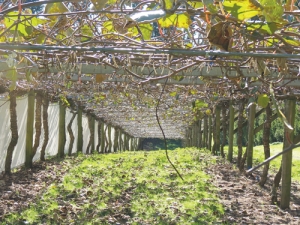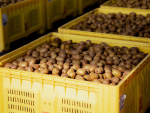When Katikati kiwifruit orchardist Sean Carnachan went to Europe in 2007 on a Zespri fact-finding mission it was the turning point in his understanding of the industry in which he is a major player.
Today he has 16ha of covered kiwifruit: 10ha in Haywards and 6ha in G3 gold.
Before his OE in 2007, Carnachan was, he says, a typical grower moaning that Zespri wanted him to do this and that. He was disconnected from the market, he says.
“Having taken that trip to Europe and subsequently learned we have a lot more around the world, it opened my eyes to the market and its expectations of food safety and what the consumers require,” Carnachan told Rural News.
“You are talking to in-market people who are buying from Zespri. In the course of our travels we had an experience in Venice on a water taxi. The operator, a young Italian, said his dad had been a fruit trader for 25 years and that his father would only buy Zespri. He talked about the quality, food safety and all the other benefits and it just flowed. What an endorsement for the Zespri brand; I was gobsmacked.”
The Zespri story is a great one and the staff do a great job selling the fruit and the story behind it, Carnachan says. He is full of praise for Zespri bringing customers to New Zealand to see the industry in action.
“They do a marvellous job bringing customers to NZ in February, March, April and May and having them meet us growers. It’s great to hear what they have to say and understand their expectations of us. I enjoy hosting them and I am proud to showcase the industry.”
Carnachan says overseas visitors are impressed that growers’ houses are alongside their kiwifruit orchards. This gives them confidence about the food safety aspect of NZ grown kiwifruit.
A major issue Carnachan sees facing the kiwifruit industry – one he devotes much time to – is encouraging young people to make a career in the sector. A stereotype perception is that every few years another drama will arise in the industry, such as PSA. People think this will happen again, he says.
“But if they understood our industry they’d realise these are just things we deal with. It’s part of running a business and no different from what a manufacturer faces regularly. All businesses have cycles like ours, but it seems we get more exposure than others.
“The result is that mum and dad say ask their kids, ‘why would you want to be involved in kiwifruit?’ They believe that PSA has written the industry off. That’s not so, we are more resilient than that.”
Carnachan has been working with his local college to show young people the employment opportunities in the kiwifruit industry. He says it’s widely recognised that before long the industry will face a serious labour shortage and the kiwifruit farmers of tomorrow have to come from the young people at school today.
“So it’s important to educate those people in colleges around NZ, but more important locally because at the moment their mums and dads are not employed in the kiwifruit industry.
“The students’ careers advisors don’t know much about kiwifruit and about primary industries in general. They say ‘you are just going to end up a picker, a packer or a pruner and that’s your lot’, but it’s wider ranging than that.
“We need to educate the kids that we have IT people, marketing people, specialists in soil science, etc. We have a whole range of skilled people in our industry. They need to understand it’s more than just picking and packing kiwifruit.”











